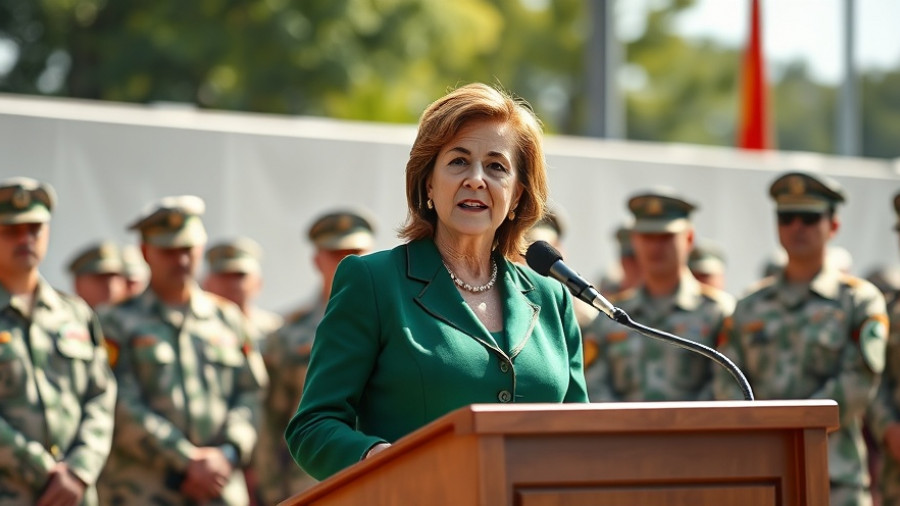
Contextualizing the Election Crisis in Tanzania
The recent electoral crisis in Tanzania highlights a crucial juncture in the nation’s democratic journey. President Samia Suluhu Hassan, seeking re-election amidst accusations of oppressive governance and a hostile political environment, has turned to neighboring leaders for support. The engagement of Kenyan President William Ruto and Ugandan President Yoweri Museveni comes in response to escalating tensions following the elections held on October 29, 2025, marked by claims of human rights abuses and violent protests across the country.
The Role of Regional Politics in Tanzania's Election
Amidst fears of unrest following an election deemed controversial by many, Suluhu’s outreach to Ruto and Museveni underlines the interconnected nature of East African politics. While the area has often been marked by individual nations' struggles for democratic governance, this election reveals a broader narrative of regional influence and cooperation—or the lack thereof. Critics have stressed how these relationships could either stabilize or further destabilize Tanzania's political landscape.
The Impact on Human Rights and Governance
Reports of suppression of dissent have surged, with opposition factions warning of severe repercussions for those expressing dissent against the ruling party, including widespread arrests and alleged fatalities during protests. The opposition party, Chadema, estimated that as many as 700 individuals have been killed since the election, pointing to an alarming disregard for human rights. This situation raises essential questions about governance practices in Tanzania—how can a nation claim to strive for democracy while silencing its critics?
Reflections on Democracy and Political Dissent
International observers have highlighted the repressive measures employed during the electoral process, including crackdowns on opposition leaders and media censorship. This systematic stifling of political dissent has drawn sharp criticism both locally and internationally, prompting a conversation regarding the state of democracy in Tanzania. How can democratic structures function effectively when fundamental rights are persistently undermined?
Historical Context Behind Tanzania's Electoral Environment
Tanzania’s political history has been characterized by single-party dominance, and the recent electoral landscape mirrors historical patterns of repression and control by the ruling party, Chama Cha Mapinduzi. Key opposition figures have been disqualified, raising fears that the upcoming elections could serve more as a coronation than a genuine electoral contest. Reassessing the legacy of colonialism and its legacy in shaping contemporary political realities offers further insights into the structural challenges facing Tanzanian democracy today.
The Global Community's Response to Tanzania's Crisis
The reaction of the global community to Tanzania's electoral situation has been one of concern. The United Nations and various human rights organizations have condemned the violence and urged the government to adopt a more transparent approach, inclusive of all political voices. As the nation grapples with internal challenges, the reaction from global players could play a significant role in shaping Tanzania's international relations and economic partnerships going forward.
Future Directions for Tanzania's Political Landscape
As Tanzania continues to navigate this electoral crisis, the implications for future governance and civil society remain paramount. Will international diplomatic pressures foster a more democratic approach, or will domestic unrest force the government to reconsider its stance on dissent? For professionals engaged in political science, governance, and human rights advocacy, the urgent need for a holistic understanding of these dynamics is more critical than ever.
The ongoing challenges presented by the electoral crisis in Tanzania serve as a striking reminder of the fragile nature of democracy, the essential role of regional cooperation, and the broader implications of governance practices across the continent. A deeper engagement with these issues not only informs our understanding of Tanzania’s political realities but serves as a clarion call for support in fostering more inclusive governance structures that respect and uphold human rights.
As Tanzania faces mounting challenges, it is crucial for the international community and local actors to consider strategies that promote democratic engagement and protect human rights. By understanding the complexities at play, we can work towards fostering a more peaceful and democratic Tanzania, ensuring that its voices are heard both locally and on the global stage.
 Add Row
Add Row  Add
Add 




Write A Comment